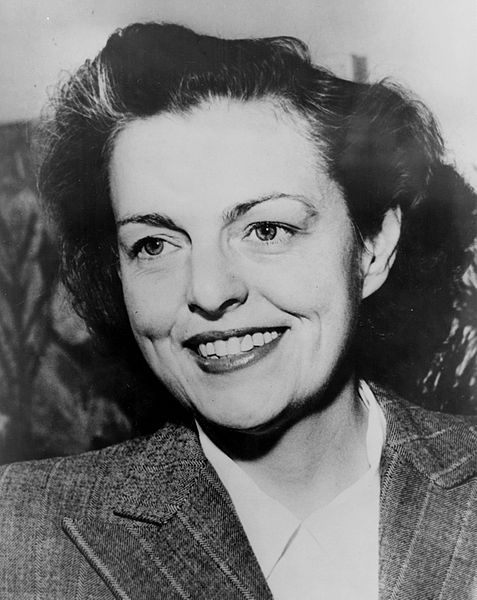2. Taking the Reins
Gahagan Douglas’ tenure as vice-president was not eventful. The president made a point of keeping her informed, at least in matters of domestic policy, and assigned her arguably important tasks such as heading the President’s Committee on Equal Employment Opportunities and the National Aeronautics Space Council. Her influence on policy in most areas, however, was minimal. As president of the Senate, she continued to work closely with Johnson, but it was obvious to all that true power remained with the leader of the Democratic caucus.
And then, of course, she was called upon to lead the nation.
The one area where she had kept been out of the loop was foreign policy, and in particular U.S. policy in Indochina. Like everyone else, she knew that Ngô Dình Diêm had been overthrown and killed in a coup not long before Kennedy’s assassination. But it was not until she was briefed by Dean Rusk on November 18 that she learned that Kennedy, disgusted by Diêm for allowing his brother Nhu to use U.S.-trained Vietnamese forces to attack Buddhists rather than fight the Viet Cong, had essentially directed the U.S. ambassador to South Vietnam (none other than her old rival Henry Cabot Lodge, Jr.) to give the ARVN his blessing to eliminate Diêm if Nhu was not removed from power — which he wasn’t.
Her feelings on the matter were reportedly mixed. Gahagan Douglas had despised Diêm as much as anyone and had been glad to see the last of him, but it did not give her confidence in the stability of South Vietnam to know that the army needed no more prompting than a wink and a nod to overthrow and kill the leader of the nation. After reading the various reports and listening to the widely varying opinions of Kennedy’s advisers — who were now, of course, her advisers — the president reached a decision. She would go ahead with Kennedy’s withdrawal of 1,000 personnel from Vietnam as described in National Security Memorandum 263. However, if South Vietnam could demonstrate political stability and respect for human rights over the next year, the United States would continue to support it. Otherwise, Saigon was on its own. “I don’t expect it to become Canada,” she said. “I just want to know that this country we’re protecting won’t collapse of its own accord.”
As it turned out, South Vietnam could not even demonstrate political stability for two full months. The general who overthrew Diêm was in turn overthrown by another general in January and tried to retake power in April, resulting in ten days of street fighting in downtown Saigon — a civil war within the war.[1] At this point, the president decided to pull out the remaining advisers and leave South Vietnam to its fate.
Not many outside the foreign policy establishment paid much attention. Although the defense of the free (or at least noncommunist) world remained a high priority, their attention was on Europe, the Middle East, Japan, Korea and Taiwan. Vietnam was a low priority.[2]
Nonetheless, there were those who tried to make an issue of it. Barry Goldwater, the Republican nominee for president in 1964, was among the loudest to accuse Gahagan Douglas of being soft on communism. He chose Congressman Walter Judd, a Cold War hawk and China expert[3], for his running mate. The fact that China successfully tested a nuclear weapon even as South Vietnam was losing ground to the Viet Cong seemed to bolster his case that Gahagan Douglas had underestimated the threat in the Far East.
In its sheer nastiness, the ’64 election is often seen as the first modern campaign. Although Gahagan Douglas and her running mate, Stuart Symington, tended to keep their criticisms of Goldwater to matters of policy, her supporters were not so restrained, hinting with varying degrees of subtlety that the senator had an itchy trigger finger where nuclear weapons were concerned. (The most famous example of this was, of course, the notorious “jump rope” ad.) Some of them would literally question his sanity in ways that a court would later find libelous. And it must be said that Goldwater himself, with his motto of “Extremism in the defense of liberty is no vice,” did nothing to convince the public it was safe to vote for him — particularly when Gahagan Douglas, during the foreign-policy debate, was able to maneuver him into a concession that, yes, he did believe tactical nuclear weapons could have been used in Vietnam.[4]
One new factor in the election was the increasing support for the GOP among white Southerners, as a result of the passage of the Civil Rights Act of 1964. Goldwater was the beneficiary of this not because, although he opposed segregation in principle, he regarded federal involvement in the fight against it as a cure worse than the disease. In spite of this, Gahagan Douglas won one of the great landslide victories of American political history, with 57% of the vote and 460 electoral votes.
The lesson the president had learned from Vietnam was to beware of allies who might turn out to be liabilities. In 1965, she put this lesson to use.
[1] Not quite how it went down IOTL, but I figure butterflies make it possible.
[2] Another butterfly worth mentioning: no Gulf of Tonkin incident.
[3] In 1960 the Republicans, while doing worse overall compared to OTL, did better in Minnesota because of Stassen’s home-state advantage. As a result, Congressman Judd’s district wasn’t redistricted out from under him.
[4] IOTL, Goldwater said something similar in May of 1964 — but not during a general-election debate.

